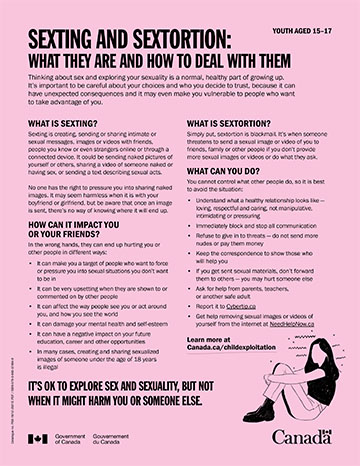Fact Sheet - For youth aged 15–17 - Sexting and sextortion
Youth aged 15–17
Sexting and sextortion: what they are and how to deal with them
Thinking about sex and exploring your sexuality is a normal, healthy part of growing up. It’s important to be careful about your choices and who you decide to trust, because it can have unexpected consequences and it may even make you vulnerable to people who want to take advantage of you.
What is sexting?
Sexting is creating, sending or sharing intimate or sexual messages, images or videos with friends, people you know or even strangers online or through a connected device. It could be sending naked pictures of yourself or others, sharing a video of someone naked or having sex, or sending a text describing sexual acts.
No one has the right to pressure you into sharing naked images. It may seem harmless when it is with your boyfriend or girlfriend, but be aware that once an image is sent, there’s no way of knowing where it will end up.
How can it impact you or your friends?
In the wrong hands, they can end up hurting you or other people in different ways:
- It can make you a target of people who want to force or pressure you into sexual situations you don’t want to be in
- It can be very upsetting when they are shown to or commented on by other people
- It can affect the way people see you or act around you, and how you see the world
- It can damage your mental health and self-esteem
- It can have a negative impact on your future education, job and other opportunities
- In many cases, creating and sharing sexualized images of someone under the age of 18 years is illegal
What is sextortion?
Simply put, sextortion is blackmail. It’s when someone threatens to send a sexual image or video of you to friends, family or other people if you don’t provide more sexual images or videos or do what they ask.
What can you do?
You cannot control what other people do, so it is best to avoid the situation:
- Understand what a healthy relationship looks like — loving, respectful and caring, not manipulative, intimidating or pressuring
- Immediately block and stop all communication
- Refuse to give in to threats — do not send more nudes or pay them money
- Keep the correspondence to show those who will help you
- If you get sent sexual materials, don’t forward them to others — you may hurt someone else
- Ask for help from parents, teachers, or another safe adult
- Report it to Cybertip.ca
- Get help removing sexual images or videos of yourself from the internet at NeedHelpNow.ca
It’s ok to explore sex and sexuality, but not when it might harm you or someone else.
Learn more at Canada.ca/childexploitation
